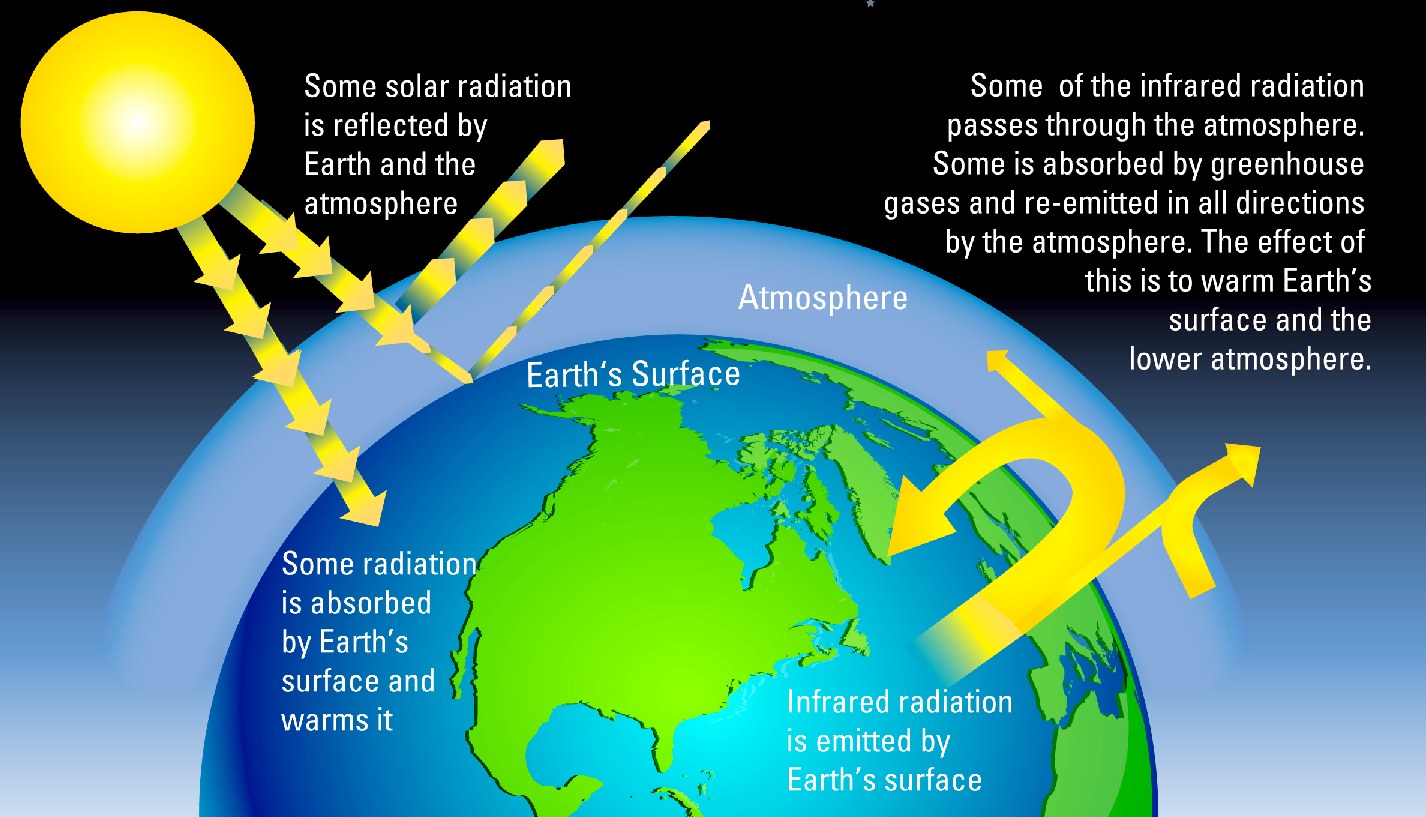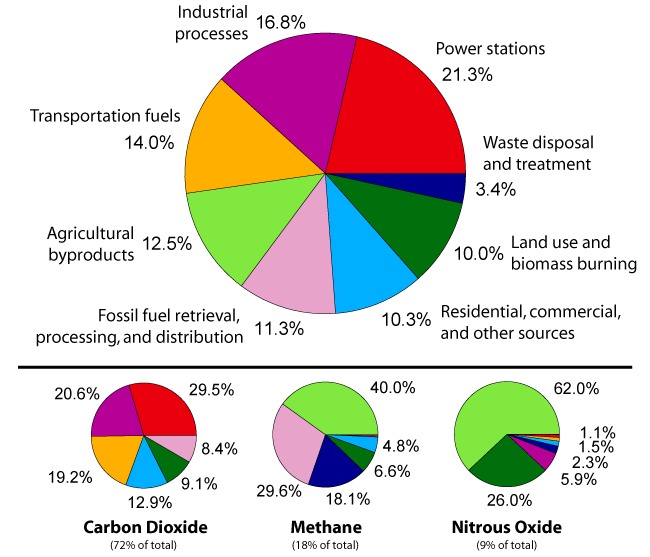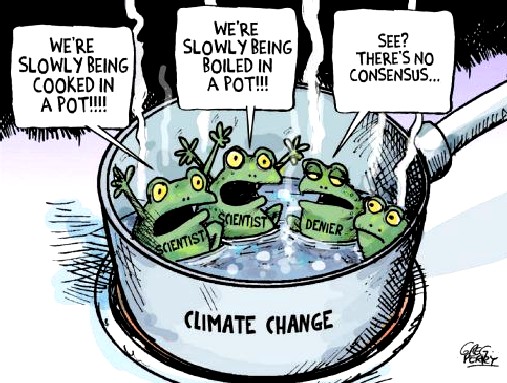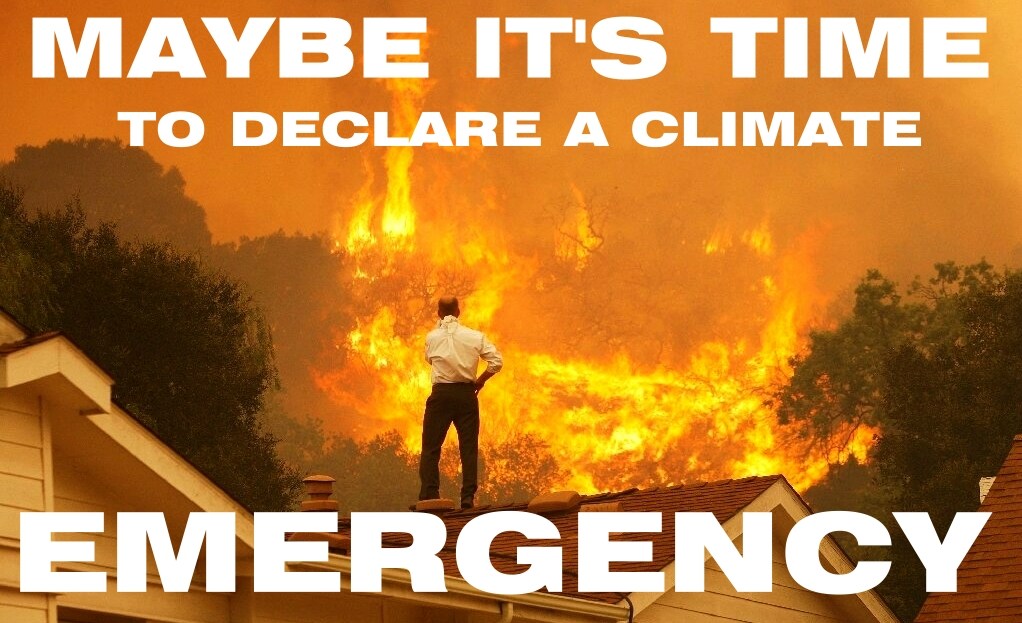|
Climate change occurs when changes in Earth's climate system result in new weather patterns that last for at least a few decades, and maybe for millions of years. The climate system is comprised of five interacting parts, the atmosphere (air), hydrosphere (water), cryosphere (ice and permafrost), biosphere (living things), and lithosphere (earth's crust and upper mantle).
When the incoming energy is greater than the outgoing energy, earth's energy budget is positive and the climate system is warming. If more energy goes out, the energy budget is negative and earth experiences cooling.
How may we arrange for that?

The hardest thing to do when thinking of ways to combat climate
change: is change.
The climate system receives nearly all of its energy from the sun, with a relatively tiny amount from
earth's interior. The climate system also gives off energy to outer space. The balance of incoming and outgoing energy, and the passage of the energy through the climate system, determines Earth's
energy budget.
According to a study by Exeter University 9th September 2022, we are close to passing 'Tipping Points' if global warming continues at the present rate.
Climate Change is linked to air pollution from greenhouse
gases. A large share of air pollution is caused by combustion of fossil fuels such as
coal and oil that is linked to lung cancer, among other ailments that cost our health services a fortune in treatment.

It stands to reason that the reduction of these fuels can reduce air pollution drastically - and climate change. Most effective in any reduction strategy, is the switch to clean power sources such as wind power,
solar power, hydro power which don't cause air pollution. Efforts to reduce pollution from mobile sources includes expanding regulation to new sources (such as cruise and transport ships, farm equipment, and small gas-powered equipment such as string trimmers, chainsaws, and snowmobiles), increased fuel efficiency (such as through the use of hybrid vehicles), conversion to cleaner fuels, and conversion to
electric
vehicles. Typically, battery electrics will be more popular, but
hydrogen powered EVs, using fuels
cells, or even H2
diesel engines powered by methanol,
should ultimately provide the longer term sustainable solution.
A very effective means to reduce air pollution is the transition to renewable energy. According to a study published in Energy and Environmental Science in 2015 the switch to 100%
renewable energy in the United States would eliminate about 62,000 premature mortalities per year and about 42,000 in 2050, if no biomass were used. This would save about $600 billion in health costs a year due to reduced
air pollution in 2050, or about 3.6% of the 2014 U.S. gross domestic product. Air quality improvement is a near-term benefit among the many societal benefits from climate change mitigation.

TOO MUCH CO2
Carbon dioxide (CO2) is essential to life on Earth but too much is the atmosphere is a bad thing where greenhouse gases prevent the sun’s heat from escaping back into space, keeping the Earth warmer than is comfortable for plants and animals to survive - hence changing our climate.
CO2 naturally moves into and out of the atmosphere. For example, plants take up and use
CO2 to produce energy, and animals breathe out CO2 made from using energy. The greatly increased amount of CO2 in the atmosphere resulting from human invention and industrialization, is causing the Earth’s temperature to rise
rapidly, including raising the temperature of our oceans
and seas.
The IPCC’s Special Report of 1.5 Degrees (October 2018),reinforced the fact that a 1.5 degree world cannot be reached without deployment of all clean technologies. This is one of the major challenges facing
mankind at this time.
The IPCC's Report from August 2021, put us at Code Red. The writing was on the wall in 2018, but world leaders carried on; business as usual. it looks very much as if in 2024 it will be the same story. By then we'll be lucky to have any ice in the
Arctic.
UN SUSTAINABILITY DEVELOPMENT GOAL
SDG13: CLIMATE CHANGE
Climate change is now affecting every country on every continent. It is disrupting national economies and affecting lives, costing people, communities and countries dearly today and even more tomorrow. Weather patterns are changing, sea levels are rising, weather events are becoming more extreme and greenhouse gas emissions are now at their highest levels in history. Without action, the world’s average surface temperature is likely to surpass 3 degrees centigrade this century. The poorest and most vulnerable people are being affected the most.
Affordable, scalable solutions are now available to enable countries to leapfrog to cleaner, more resilient economies. The pace of change is quickening as more people are turning to renewable energy and a range of other measures that will reduce emissions and increase adaptation efforts. Climate change, however, is a global challenge that does not respect national borders. It is an issue that requires solutions that need to be coordinated at the international level to help developing countries move toward a low-carbon economy.
To strengthen the global response to the threat of climate change, countries adopted the
Paris Agreement at the COP21 in Paris, which went into force in November of 2016. In the agreement, all countries agreed to work to limit global temperature rise to well below 2 degrees centigrade. As of April 2018, 175 parties had ratified the Paris Agreement and 10 developing countries had submitted their first iteration of their national adaptation plans for responding to climate change.
REFERENCE
https://
|




